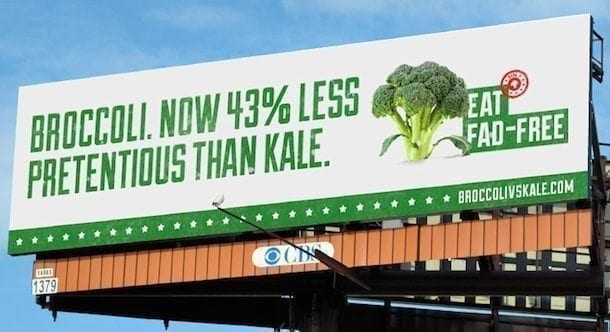
When it comes to healthy eating, most of us know vegetables are king. They’re packed with vitamins and nutrients, full of fiber, and low in calories. But lately is seems as though some veggies are getting more attention than others, namely kale.
Touted by many as “mother nature’s multivitamin,” kale’s 45 known flavonoids combine antioxidant and anti-inflammatory benefits that have been shown to prevent bladder, breast, colon, ovarian and prostate cancers. And in the past two years, articles and recipes featuring kale have exploded. Want to know the Top 10 Health Benefits of Eating Kale? Looking for an easy recipe for Sauteed Kale? How about a tongue-in-cheek review of an all-kale diet? One quick Google search gives you all of that and more.
But does kale really deserve all that attention? A group of Yale students and business owners in New Haven, CT says no, and their anti-kale agenda suggests the leafy green’s hype comes at the detriment of other vegetables.
Working together, students, Monica Dileo, Adam Goff, and Drew Morrison, created the Broccoli vs. Kale campaign to promote the lesser known veggie. They partnered with local businesses, including the Elm City Market and Claire’s Corner Copia, to put advertisements in their stores and to offer broccoli specials for one month, and placed billboards along interstates and on the sides of buses. (The photo above, taken by Eamon Heberlein, is an example of one of the billboards.) The campaign showed how a community can rally around a vegetable or healthy eating in general, and raised nearly $2,500 on Kickstarter—one supporter and donor even presented President Obama with a “Barackoli” pin.
While the campaign garnered some media attention, and signs encouraging shoppers to purchase more broccoli worked, there’s no reason to fully turn your back on kale—or any other vegetable for that matter. In a recent study of powerhouse fruits and veggies, the two cruciferous cousins fall in the middle of the nutrient density scale: kale gets a 49.07 and slightly edges out broccoli, which gets a 34.89, making them both extremely healthy choices. (For reference, at the bottom of the list white grapefruit clocks in at 10.47 and watercress ranks number one at 100.)
Kale might offer a few more nutrients than broccoli, making it a slightly better choice in the “good for you” department. But the fact remains: man cannot live on kale alone! And whether you buy “fad food” or not, the key to a healthy diet is variety. Fill your grocery cart with an assortment of green veggies and you can’t wrong.
What do you think—is fad-free broccoli more appealing to you than kale? Which vegetables show up on your plate most?



